 History
History  History
History  Animals
Animals Ten Times It Rained Animals (Yes, Animals)
 Mysteries
Mysteries 10 Devastating Missing Child Cases That Remain Unsolved
 Creepy
Creepy 10 Scary Tales from the Middle Ages That’ll Keep You up at Night
 Humans
Humans 10 One-of-a-kind People the World Said Goodbye to in July 2024
 Movies and TV
Movies and TV 10 Holiday Movies Released at Odd Times of the Year
 Politics
Politics 10 Countries Where Religion and Politics Are Inseparable
 Weird Stuff
Weird Stuff 10 Freaky Times When Famous Body Parts Were Stolen
 Miscellaneous
Miscellaneous 10 Interesting Things Manufacturers Stopped Making and Why
 Gaming
Gaming 10 Funny Tutorials in Games
 History
History 10 Desperate Last Stands That Ended in Victory
 Animals
Animals Ten Times It Rained Animals (Yes, Animals)
 Mysteries
Mysteries 10 Devastating Missing Child Cases That Remain Unsolved
Who's Behind Listverse?

Jamie Frater
Head Editor
Jamie founded Listverse due to an insatiable desire to share fascinating, obscure, and bizarre facts. He has been a guest speaker on numerous national radio and television stations and is a five time published author.
More About Us Creepy
Creepy 10 Scary Tales from the Middle Ages That’ll Keep You up at Night
 Humans
Humans 10 One-of-a-kind People the World Said Goodbye to in July 2024
 Movies and TV
Movies and TV 10 Holiday Movies Released at Odd Times of the Year
 Politics
Politics 10 Countries Where Religion and Politics Are Inseparable
 Weird Stuff
Weird Stuff 10 Freaky Times When Famous Body Parts Were Stolen
 Miscellaneous
Miscellaneous 10 Interesting Things Manufacturers Stopped Making and Why
 Gaming
Gaming 10 Funny Tutorials in Games
10 Shocking Ways The West Abuses Developing Countries
The developing world has been abused for centuries, used as a resource to be exploited for profit and gain. But now we’re in the 21st century, and everyone cares about being good. That’s why we have Fair Trade coffee with breakfast, right? Well, it’s a nice idea, but there are a lot of people on a lot of continents who could offer a strong argument that rich Westerners are still really bad news.
10 Exporting Medical Nonsense

Wealthy nations have contributed a lot to the health of many developing nations. The United States Center for Disease Control spearheaded the campaign to eradicate Guinea worm disease from Africa, for example. But not everyone in developed countries is so keen on actual medicine. Proponents of a lot of nonsense also want to make a difference. Some do, and that’s not a good thing.
Among the famous charities that operate on the idea of a shared humanity are Doctors Without Borders and Reporters Without Borders, but there are dozens of organizations that have taken on a snappy “Without Borders” name. The borderless teachers, scientists, vets, and pharmacists are among those who can clearly do some good with their skills. The homeopaths, naturopaths, and chiropractors that shun international boundaries, on the other hand, ultimately end up doing more harm than good.
Aid groups have encouraged midwives in Kenya to use homeopathy during difficult deliveries. In countries like Guatemala, El Salvador, and Sri Lanka, homeopaths have encouraged poor and uneducated people to take their “natural remedies” for malaria, cholera, and typhoid. It’s not hard to figure out the consequences of offering magical water rather than actual medicine to impoverished people with deadly diseases.
Not content with killing children in Australia, the United States, and doing their best in the UK, anti-vaccine campaigners are also spreading their harmful message to developing nations. Vaccine scares, many fueled by the internet, hamper vaccine programs that could save millions of lives. The sad fact is that in less developed countries, nonsense can do even more harm than it does in wealthier nations.
9 Tax Havens
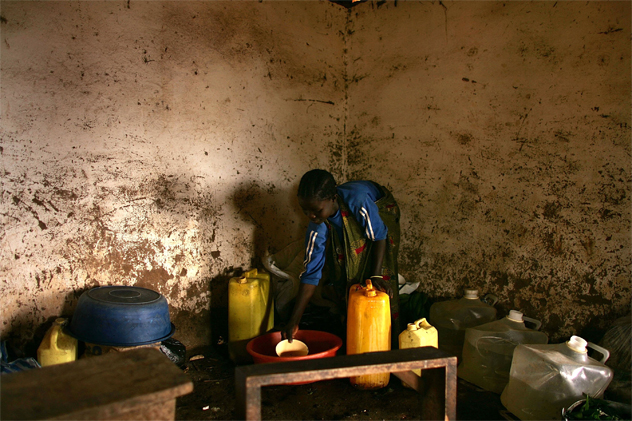
Benjamin Franklin famously wrote that nothing in life is certain except for death and taxes. Western companies disagree: They’re quite happy to leave death as the only certainty, and hide all their money away offshore. If companies stopped avoiding taxes in developing countries, the amount of money left for the country would be more than triple what those countries currently get in aid.
Nearly half of the money invested in the developing world gets channeled through a tax haven. Tax avoidance in developed countries has been a big news story in many places, yet the poorer countries get it much worse—it’s estimated that they lost $5.86 trillion from 2001 to 2010.
In the Democratic Republic of Congo, two mining companies on the London Stock Exchange did deals offshore that robbed the African nation of enough to cover its education and health budgets for two years. Kofi Annan has called the current tax situation “unconscionable,” while charity ActionAid says tax havens are among the biggest obstacles to global development.
Despite that, Barclays Bank published a brochure in 2013 promoting Mauritius as the ideal place to use when investing in Africa. It called the island “the offshore financial centre of choice for India and the sub-Saharan region,” and said that it could help investors “make the most of every tax advantage available.” It garnered a lot of criticism, and that brochure is no longer on their website.
8 Medical Experiments

The cost of running a clinical trial in the United States is up to 20 times higher than the cost in India. In a related statistic, the chance of dying in a clinical trial is 10 times higher in India. That’s only one issue with the way drug companies are using the world’s poor as guinea pigs.
In September 2013, India’s Supreme Court put a halt to 167 clinical trials. This decision followed the death of several teenage girls in an HPV vaccine trial, which was being run by an American non-profit organization. Investigators found that parental consent forms hadn’t been filled in, and that those taking part had been misled into thinking they were taking part in a national vaccination campaign, not a clinical trial. At the end of 2013, the Indian government brought in sweeping reforms. All trials now need to be scrutinized by an independent ethics committee—as has been the case in the United States since 1975.
Though it was questionably run, at least an HPV trial in India could benefit the Indian people—cervical cancer kills 74,000 women there every year. But some US companies take advantage of the slack regulations in developing nations to run trials on drugs designed for first-world problems like hay fever and overactive bladder. The drugs developed from these trials are ultimately destined for Western markets. Meanwhile, killer diseases like tuberculosis continue to kill the people in the countries being used, while the drug companies simply ignore them.
Some people have criticized the changes in India, mainly due to the financial impact on India’s biotechnology industry. It’s easy to see where they’re coming from. After all, why should the ethical treatment of human beings get in the way of making money?
7 Creating Homophobia
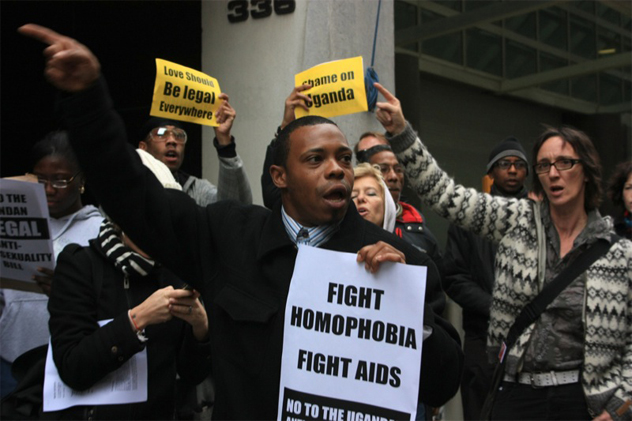
Many Africans believe that “gayness” is an import from colonial Europe, but they’re almost certainly wrong. Records of sexuality in Africa before the Europeans arrived are slim, but the best of our knowledge suggests homosexual relationship were accepted in many cultures. People have pointed out that same-sex attraction is a universal human trait. The penal codes that made sodomy illegal were introduced by the Europeans, though. So were translations of the Bible, which was presented as a literal text.
Today, the struggles faced by LGBT people in the world’s poorest nations eclipse those they face in Western societies. Many religious leaders and politicians in the West have been among the international critics of anti-gay laws in Uganda. Other people see Africa as a convenient place to push their hateful and outdated views on homosexuality.
The Christian Right in the US is at the forefront of this push. Today’s missionaries are very open about their desire to instill anti-gay values—and the fact that they’re doing it because it’s an easier fight there than it is back home. One missionary said, “fifty percent of the population is under fifteen years old. We can multiply ourselves in these young people and they can reach multitudes, they can reach nations.”
Yet it’s not just youngsters that are being targeted. Other pastors host conferences in Africa to teach about the “gay agenda.” These seminars are attended by politicians, police officers, and other influential people. The organizers teach that gay men regularly sodomize teenagers, and that their goal is to destroy marriage and create a promiscuous society. Their influence is directly related to efforts to introduce the death penalty for being gay. Currently, the penalty for being gay is only life in prison.
6 Starving Them
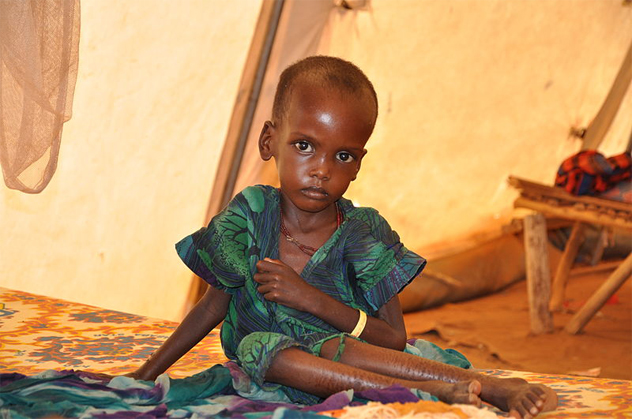
Ever since Bob Geldof pointed it out in the ’80s, most people have agreed that starvation is a bad thing. Yet sometimes, that sentiment only extends about as far as the willingness to attend a rock concert. Case in point, Westerners are eating food that has been imported from poor parts of Africa and South America, while people in those countries are dying due to a lack of nutrition.
Somalia was exporting food in the 1980s when it was in the midst of a famine. Thirty years later, it continued to export livestock during a famine in 2011. The people of Senegal have survived by fishing for centuries, but their food sources have been severely depleted by European trawlers. Many of these ships ignore regulations completely, and go so far as to fish under a Senegalese flag before shipping their catches north.
Argentina is one of the world’s biggest exporters of food, yet its indigenous communities are often blighted by malnutrition. Neighboring Bolivia is facing a crisis sparked by international demand for quinoa, its staple crop. The grain’s popularity abroad, particularly in the US, has caused the price of the crop to soar to the point that poorer Bolivians can no longer afford it.
It’s not just food—the West’s desire for biofuels has also caused countries to export crops for use as ethanol. Swaziland did so during a famine in 2007. This is encouraged by billions of dollars in subsidies from Europe and the US. Each year, Europe alone fuels cars with crops that could feed 100 million people. The biofuel industry also devastates the land and livelihood of small farmers in many places—all so the Western nations can be “green.”
5 Dumping Waste
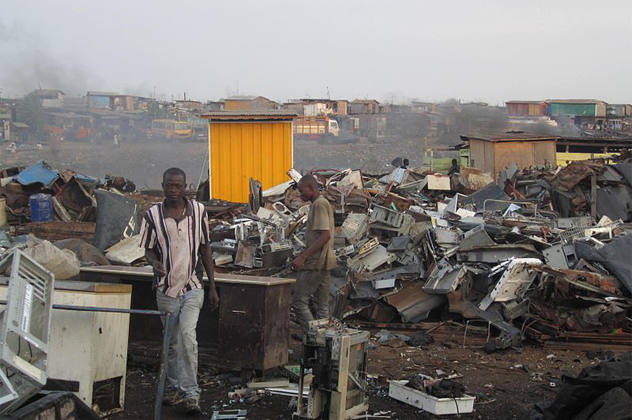
Agbogbloshie, in Ghana, has been given the nickname Sodom and Gomorrah by locals. The name’s not a reference to sexual deviancy, but rather to the flaming wasteland that God made of the two towns in the Bible. An image search for “Agbogbloshie” makes it clear that they’re not at all wrong. The reason for the horrific state of the area is that each year, hundreds of thousands of tons of electronic waste from Europe is dumped there. Locals burn it, which releases toxic fumes, but the process allows them to collect and sell the valuable copper inside.
The impact on the environment—and the people—is dramatic. Lead quantities in the soil have been found to be 45 times the safe levels recommended by the United States Environment Protection Agency. Blood tests on a local volunteer found aluminum levels at 17 times the safe amount.
The European Union has sanctions against exporting waste to developing countries, but those rules are aggressively ignored. Many waste goods are classed as “charitable donations” before they’re dumped on scrap heaps. Millions of the world’s poor, many of them children, dismantle the items in unsafe conditions to sell the small bits of metal as scrap. Guiyu in China is another town that has been overwhelmed with imported waste (as with Agbogbloshie, you only need to do an image search to understand the severity of the problem).
This is one area on this list where the developing countries are fighting back. China has started turning away a lot of plastic that US “recycling” companies are trying to dump there. Ghana has impounded vast quantities of old fridges, almost all of them from the UK. The Ghanaian government implemented a ban on the environmentally damaging appliances in June 2013—the authorities caught 177 illegal shipments by November. It looks like the West may actually have to deal with its own waste pretty soon.
4 Exporting Obesity

By far the biggest food-related health problem in wealthy nations is obesity. In the United States, some ethnic groups are approaching a 50 percent rate of obesity, while even the least impacted groups can count over a third of their members among the seriously overweight. There’s some sign that the trend is going down—for example, childhood obesity has been declining in recent years. Unfortunately, the habits that cause obesity in America are a prime export, along with all the associated problems.
The problems start early. It’s been established that breastfeeding of babies reduces the likelihood of obesity in later life. Big companies such as Nestlé and Danone, based in wealthy European nations, nevertheless promote their baby formula in developing nations. As well as publishing information, companies have also been found to give gifts to healthcare workers, both of which practices infringe on longstanding ethical guidelines.
The other companies making an impact are fast food restaurants. Chains like McDonalds are among the first Western companies to penetrate emerging markets. They target their advertising toward children, who are less attached to native cuisine. Super-size portions are introduced to cultures for the first time, and local restaurants may be inspired to do the same to compete. As with America, it’s often the less affluent that end up spending a large proportion of their money on fast food.
The result of all this is that Africa and Latin America have the highest rate of increasing obesity in the world. It’s not just the poor eating habits introduced from overseas that cause the problems. More people are living in cities on those continents, and that’s a lifestyle with less exercise and more snacking than in the countryside. Nevertheless, corporations have watched their practices trash the health of millions of people in their own countries for decades, and are quite happy doing the same thing in their brand new markets.
3 Taking Their Talent

You don’t have to be a talented genius to understand the benefit of having talented geniuses around. Doctors, scientists, engineers, and teachers may not be as good looking as most writers on the internet, but they’re certainly far more important for bolstering a developing economy. It’s therefore a big problem that in some of the poorest countries in Africa and Central America, tons of university graduates leave to work in the world’s richer nations.
Even some of the most prominent emerging economies, like China and India, are losing some of their most promising individuals to the lure of a better life elsewhere. Healthcare is one of the most highly impacted areas. In 1970, 90 percent of physicians that left their home country moved to just five countries: the US, the UK, Germany, Canada, and Australia. It’s hard to blame the migrants; the opportunities and working conditions are far greater in richer nations, but the detriment to their home nation—which invested in their training—is clear.
UNESCO is among the international bodies trying to figure out what to do about it. The issue is that refusing to allow talented people to pursue their best opportunities, wherever those opportunities may be, is inherently unfair to individuals. Balancing that against the needs of less developed countries is complicated and there’s really no obvious solution.
2 The Modern Slave Trade

The practice of wealthy Western nations importing slaves from poorer countries is often thought of as one of history’s greatest horrors—yet it continues in astonishing numbers today. Each year, anywhere from 200,000 to 500,000 women get trafficked to the West from developing countries. Western Europe and North America are the major destinations for forced sex workers. Since the 1970s, 30 million have been sold into slavery. That’s more than the entire African slave trade up to 1850.
One of the methods used to get Asian women into America is to pay soldiers to marry them, often thousands of dollars. Once the new bride is in the country, they divorce and the woman ends up working in an illegal brothel.
The problem is growing, too. In the UK, sex workers and domestic servants are brought over by criminal gangs from Vietnam, China, Nigeria, and Eastern Europe. A third of the victims are children. While slavery is bad enough, an even darker trend is emerging. The UK recently had its first case of trafficking for organs, with a group planning to sell a child’s kidneys. The girl was brought from Somalia, and authorities think that she was almost certainly not an isolated case.
1 Worker Exploitation
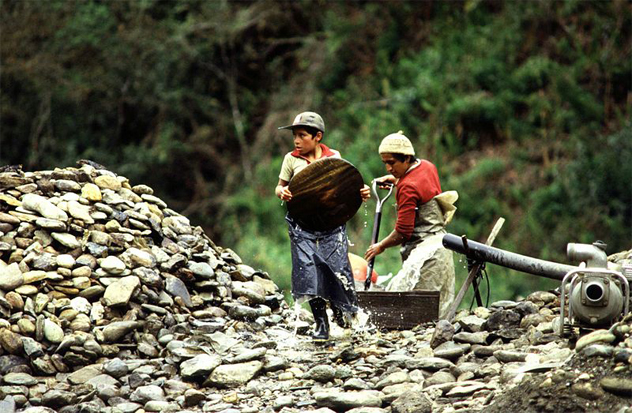
There have been some pretty big news stories on factory conditions abroad. Over 1,000 people were killed when the Rana Plaza building collapsed in Bangladesh. The factory supplied garments to numerous companies, including Wal-Mart and Primark. Workers had been ordered into the building even though there were cracks in the walls and the lower floors had been evacuated. Following the accident, the conditions and safety of factories in Bangladesh were criticized by Human Rights Watch and Pope Francis, while Barack Obama suspended trade privileges with the country.
Of course, it’s good that people responded to one of the worst industrial disasters in world history with talk of making things better, but doing something beforehand would’ve been nice. We can let Human Rights Watch off on that front; they’d called on Washington to press for improved labor conditions in the past. At least the US government cares now though. Right?
Not so much, it turns out. The US government spends $1.5 billion each year buying things from factories overseas. It does have rules for avoiding companies that exploit and abuse workers, but they simply aren’t followed. The US buys Marine Corps shirts that come from a Bangladesh factory that uses child labor. The Army and Air Force get their clothes made by underage workers in Cambodia.
Rana Plaza was the biggest disaster in Bangladesh recently, but not the only one. A few months before the collapse, 112 people were killed in a fire at a textile factory there. Some European companies that sourced their products from the two factories have set up a compensation fund for workers from both disasters, but none of the American companies have decided to take part. Among the companies turning a cold shoulder to the issue are Sears, Wal-Mart, and Disney.
The entire aid package would cost $5.7 million. Wal-Mart was among the factory’s biggest customers (they also use dozens of other factories in Bangladesh that failed inspections recently). Yet the retailer made a profit of $15.7 billion in 2012. They could fund the entire aid package by themselves with what they make in three hours. But that would involve thinking of workers as human beings that deserve some sort of standard of living, so don’t hold your breath.
Alan earned more from this list than a Cambodian factory worker makes in a month. The world makes him sad and angry. You can listen to him complain about it on Twitter.








![10 Real Countries Straight Out Of The Handmaid's Tale [DISTURBING] 10 Real Countries Straight Out Of The Handmaid's Tale [DISTURBING]](https://listverse.com/wp-content/uploads/2019/11/offredandafghan-150x150.jpg)